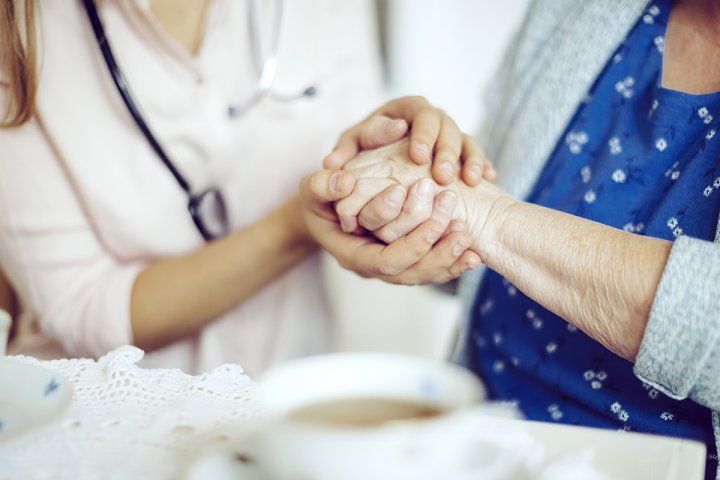Emotional Abuse May Be Linked with Menopause Misery
Night Sweats, Painful Sex, Hot Flashes More Common When Women Are Belittled, Assaulted, Traumatized, UCSF-Led Study Shows

Smoking, obesity and a sedentary lifestyle have long been linked to heightened symptoms of menopause. Now, a study headed by UC San Francisco has identified another factor that may add to menopause torment: an emotionally abusive partner or spouse.
In the study of more than 2,000 midlife and older women, researchers found that 1 in 5 women had been emotionally abused by their current or former partners, and that these women had 50 percent higher odds of night sweats and 60 percent higher odds of painful sex.
Among women with symptoms of post-traumatic stress disorder (PTSD) or those who were victims of sexual assault or domestic violence, the prevalence of menopausal pain and discomfort was also significantly higher, the authors said in their study, which publishes in JAMA Internal Medicine on Nov. 19, 2018.
Higher Odds for Menopause Symptoms
Women with PTSD symptoms had just over three times the odds of sleep difficulties and more than twice the odds of reporting vaginal irritation and painful intercourse. Women who were victims of sexual assault or violence by former or present partners had 40-to-44 percent higher odds of painful sex.
“Traditionally, menopause symptoms have been largely attributed to biological and hormonal changes, as well as negative mood symptoms, health-risk behaviors, cardio-metabolic risk factors and chronic health conditions that occur at a higher rate during and after menopause,” said first author Carolyn Gibson, PhD, a clinical research psychologist affiliated with the UCSF Department of Psychiatry.
“Stress related to emotional abuse and other traumatic exposures may influence the hormonal and physiological changes of menopause and aging, affecting biological susceptibility as well as the subjective experience of these symptoms,” she said.
Gibson and her team looked at three types of menopause symptoms among the 2,016 participants: difficulties with sleep; vaginal discomfort such as dryness, irritation and painful sex; and vasomotor symptoms, which includes night sweats and hot flashes.
‘Surprisingly Common’ Symptoms
Participants were enrolled in Kaiser Permanente Northern California, an integrated health care system serving approximately 30 percent of the region’s population. Their average age was 61; most were postmenopausal (77 percent), college-educated (81 percent), and overweight or obese (74 percent). Approximately 39 percent of participants were white, while 20 percent were Hispanic, 21 percent black and 19 percent Asian.
Traumatic exposures, especially emotional abuse and PTSD symptoms, were “surprisingly common” in this sample of women, according to Gibson, who described participants as “relatively healthy, well-educated and with better than average access to health care.” Some 21 percent of women (423) said that they had been emotionally abused by their former or current partner. This was defined as “made fun of, severely criticized, told you were a stupid or worthless person, or threatened with harm to yourself, your possessions or your pets.”
Some 23 percent (450) reported symptoms that matched a diagnosis of PTSD, 16 percent (316) said they were or had been victims of domestic violence and 19 percent (382) had experienced sexual assault.
“The data show that experience of domestic violence and emotional abuse, sexual assault and clinically significant PTSD symptoms are common, and may affect women’s health across the lifespan,” said Gibson, who is based at the San Francisco VA Health Care System. “Our findings suggest that routine assessment and recognition of PTSD symptoms and lifetime traumatic exposures when women are seen by health care providers may enhance the effective management of menopausal symptoms.”
Study co-author Brigid McCaw, MD, medical director of the Kaiser Permanente Family Violence Prevention Program, agrees: “These findings support the recent U.S. Preventive Services Task Force recommendation to screen for emotional or physical abuse given the significant and long-lasting health impact.”
Authors: The senior author is Stephen Van Den Eeden, PhD, of Kaiser Permanente Northern California’s Division of Research in Oakland, Calif. Co-authors are Alison Huang, MD, and David Thom, MD, PhD, of UCSF; and Leslee Subak, MD, of Stanford University School of Medicine.
Funding: The study was supported by the UCSF-Kaiser Permanente Grants Program for Delivery Science; Office of Research on Women’s Health Specialized Center of Research, and the National Institute of Diabetes and Digestive and Kidney Diseases. Research was also supported by the VA Advanced Fellowship Program in Women's Health and VA Health Services Research & Delivery CDA 17-018 (CJG).
Disclosures: Huang has received research grants from Pfizer Inc. and Astellas through UCSF to conduct research unrelated to this manuscript. The content is solely the responsibility of the authors and does not necessarily represent the official views of the Department of Veterans Affairs.
UC San Francisco (UCSF) is a leading university dedicated to promoting health worldwide through advanced biomedical research, graduate-level education in the life sciences and health professions, and excellence in patient care. It includes top-ranked graduate schools of dentistry, medicine, nursing and pharmacy; a graduate division with nationally renowned programs in basic, biomedical, translational and population sciences; and a preeminent biomedical research enterprise. It also includes UCSF Health, which comprises three top-ranked hospitals, UCSF Medical Center and UCSF Benioff Children’s Hospitals in San Francisco and Oakland, and other partner and affiliated hospitals and healthcare providers throughout the Bay Area.